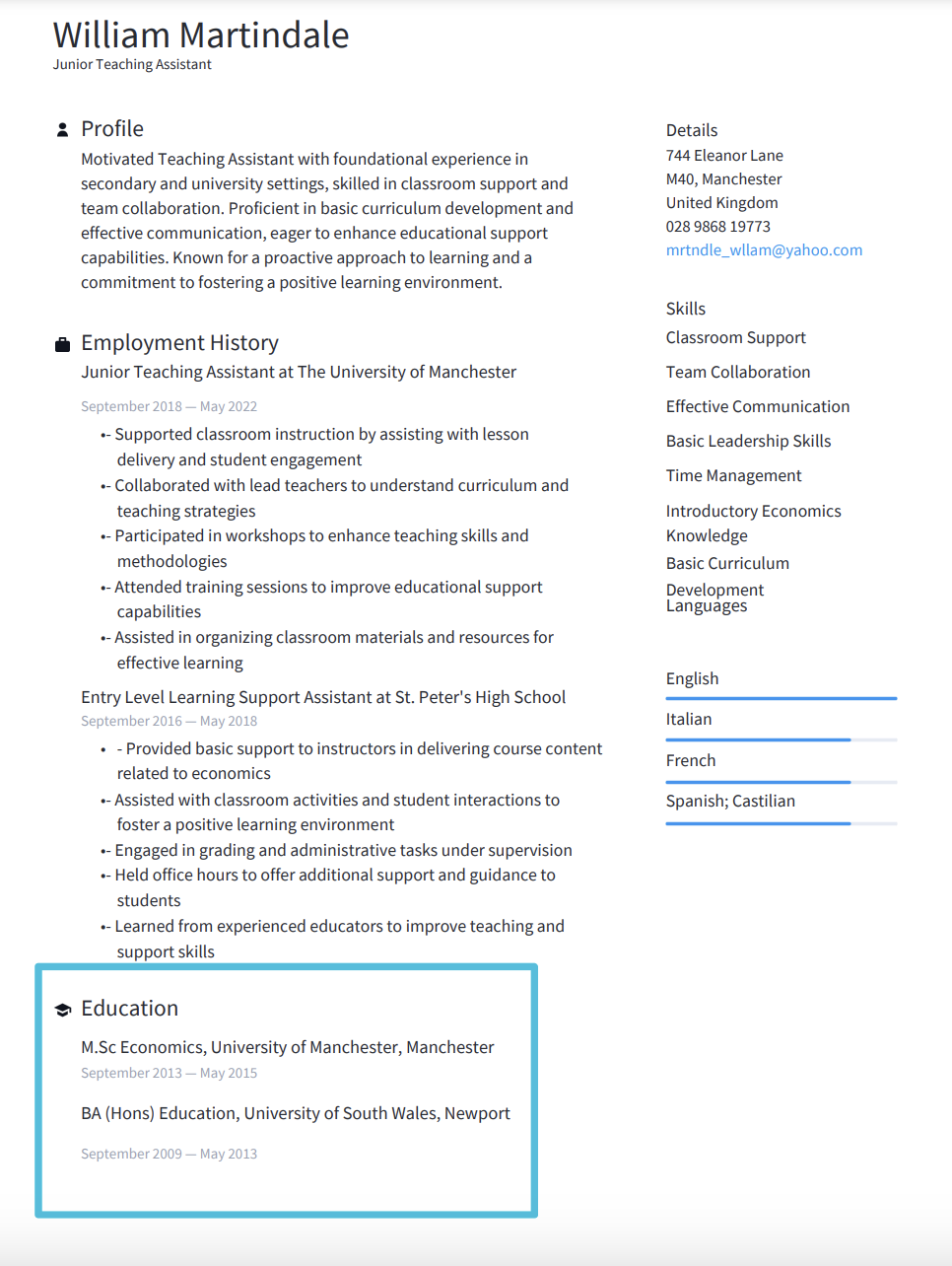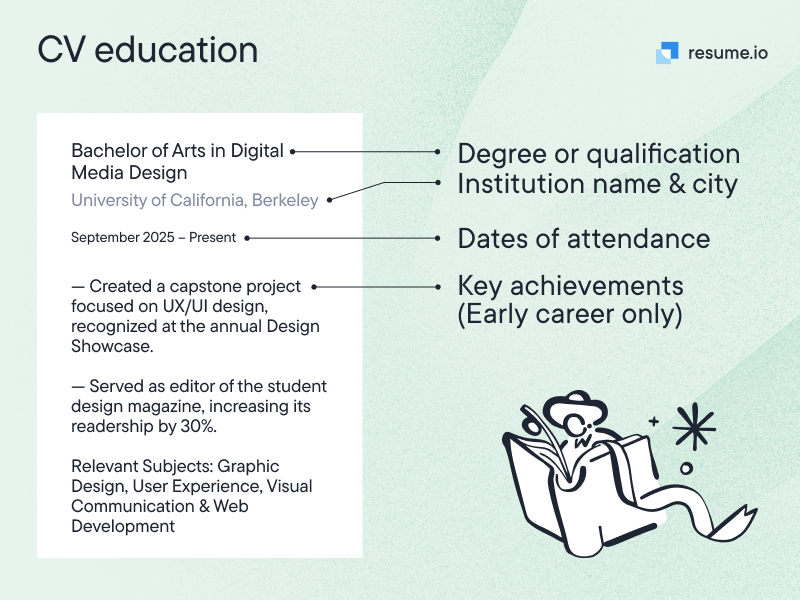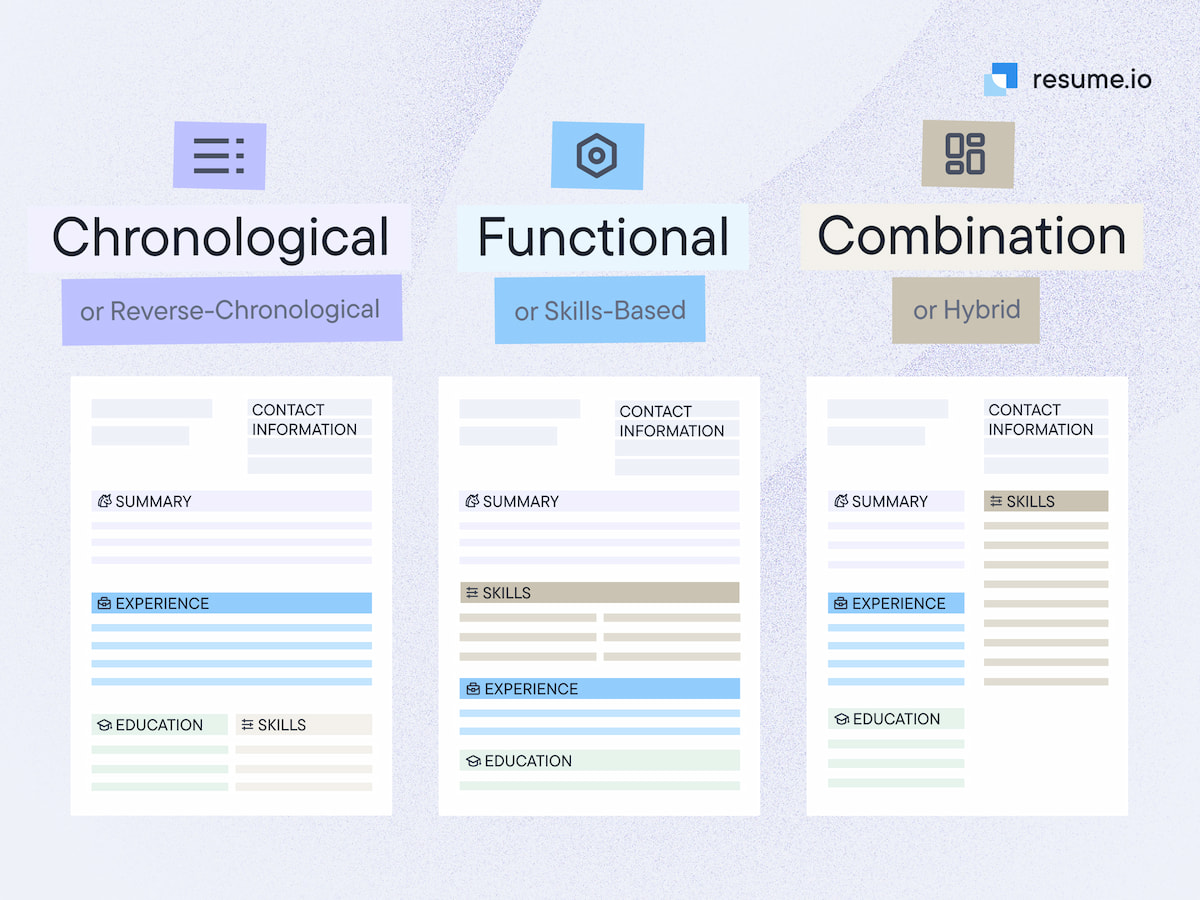Many people think that the education section of their CV is not that important, instead channelling their efforts into other areas of their job application. However, your qualifications are the foundation of your career and can reassure an employer that you have the essential knowledge to get the job done.
There’s an art to creating a compelling and convincing CV education section. Let’s break down the steps you need to take to tackle this education section of your CV and ensure that you enter the job market—or continue your professional journey—with your best foot forward.
Where to list education on a CV

Before you start to write your education section, you’ll need to decide where best to place this information on your CV. This will very much depend on your unique educational path.
- Entry-level candidates and career changers. Place your education section on a CV below the professional summary. Employers will quickly see that your education has provided you with the skills and qualifications required to excel in their industry. Shining a light on your education will give you a stronger position, as it minimises a lack of experience.
- Experienced professionals. Recruiters will be more interested in reading about relevant work experience, so you can move the education section to the end of your CV.
- Non-traditional learners. For those without formal qualifications, you can highlight relevant courses, certifications, and skills in place of traditional education.
What to include in your CV education section
Next up, you’ll need to decide what to include in your CV education section. There are several key elements that a recruiter will expect to find in this education section of your CV:
- Your qualifications and grades achieved
- The names of the institutions (school, sixth form, college, or university)
- Dates of attendance or the year each qualification was awarded

Optional elements you might also want to include are academic awards—for recent graduates—relevant modules, projects, research reports, and dissertations. Try to avoid including too much information, as this can make your CV look disorganised and cluttered. Clear and concise is the best approach.
Ready to present your education in the best possible light? Here’s a breakdown of the main education types in the UK, with examples of how they should be displayed in your CV.
Secondary education (GCSEs, A-Levels, BTEC, etc.)
If you’re currently completing or have recently finalised your GCSEs, then this is the most important time to include your high school education on your CV. When your GCSEs are in progress, you would just need to clarify that any results are predicted grades.
At this point, your GCSEs will be the peak of your formal education, so it makes sense to pack some punch and include any standout achievements. Include your GCSE grades in your CV education section alongside each subject too, if they are impressive.
Here’s an example:
9 GCSEs including English & Mathematics
Green Tree High School, Manchester (2022–2024)
Grades: English (9), Mathematics (8), Science (8), Business Studies (8), Geography (7), Science (7), Psychology (7), French (7), Computer Science (6)
Awards: Laurie Dent Award for English Literature
Moving forward, you may decide to continue your education at sixth form or college. Options can include completing A and AS-level courses, as well as technical qualifications such as BTEC or NVQ. As your education shifts towards new horizons, so should your CV.
While you should put your GCSEs on your CV, you don’t need to list every subject. Most employers prefer a concise CV education section. For this reason, it’s fine to summarise the number of GCSEs completed and confirm that this includes Mathematics and English. Again, grades can be added if you excelled in your studies.
Here’s how to list this information:
3 A-Levels: Biology (A), Chemistry (A), Mathematics (B)
Green Tree Sixth Form, Manchester (2022–2024)
10 GCSEs including English & Mathematics - Grades 9–6
Green Tree High School, Manchester (2020–2022)
Undergraduate degrees
Regardless of where you are in your career, it’s always a good idea to include undergraduate degrees on your CV education section. Recent graduates should also keep secondary education on their CV, but more experienced professionals can omit lower-level qualifications if they don’t add value.
Similar to your secondary education, only mention strong grades—a first or 2:1—in relation to your bachelor’s or foundation degree. Individual modules can also be listed if you’re a recent graduate, but make sure they are relevant to the job opening.
Here’s an example you can follow:
BA (Hons) Business Studies (2:1)
Loughborough University, UK (2023)
Key Modules: Strategic Marketing, Supply Chain Management, Sustainable Enterprise & Innovation, Leadership & Management
Masters and postgraduate degrees
As the education section of your CV is structured in reverse chronological order, any postgraduate studies would be placed above your undergraduate degree. After all that investment in your education, these studies deserve pride of place!
These qualifications follow a similar format to undergraduate degrees in your CV education section, with the exception of including the title of your dissertation or thesis.
Here’s an example of how to list this information:
MA, English Literature
Bristol University, UK
Dissertation: “Freudian and Jungian Literary Analysis: Under Milk Wood”
BA (Hons) English (2:1)
University of London, UK
Key modules: American Literature, Postcolonial Literature in English, Shakespeare, Advanced Creative & Life Writing
Certifications and professional development courses
Finally, don’t forget to add any relevant certifications or training courses to the CV education section or a dedicated professional development section on your CV.
Unlike general academic degrees, these certificates highlight specific skills and showcase your dedication to ongoing professional growth. They often demonstrate niche expertise that is directly relevant to the job or industry you're targeting. This can go a long way to impressing the hiring manager, so it’s important that these additional qualifications stand out.
Detail certificates in the same way as any other qualification: include the name of the certificate, the issuing body, and the year you received it. If you have a longer list of relevant certifications, it makes sense to put these in a separate section following your education section.
Here’s how you can present your professional development within your CV education section:
BEng, Electrical Engineering
Newcastle University, UK
Professional Development
Engineer in Training (EIT) / P. Eng. Licenses (In progress)
Project Management Professional, Project Management Institute (2020)
Specialised situations
Everyone’s education is unique, so it’s inevitable that some specialised situations will crop up if you haven’t followed a traditional academic path.
Here are some strategies to help you navigate these situations and ensure your CV education section is presented in the best possible light.
If you didn't graduate
Incomplete qualifications should generally be excluded from your CV. Although you probably have valid reasons for not completing a course, mentioning it in your CV can make your application look weaker when compared with other candidates.
The only exception would be if your unfinished qualification leaves a significant gap on your CV. In this scenario, focus on putting a positive spin on your partial qualification. Avoid using words like “incomplete” or “unfinished,” as these will stick out like a sore thumb and leave a bad impression. Instead, detail any relevant coursework or projects you completed during these studies to show the specialist knowledge you gained.
Here’s an example:
Marketing BA - Completed 20 credit hours
Leeds University, UK
Modules included: Social media marketing, SEO/SEM, Web analytics, Digital marketing, Brand loyalty.
Relevant coursework and skills developed
In most cases, you don’t need to include coursework in your CV education section. For more experienced candidates, this can be a waste of precious space since recruiters also prefer a clear and concise approach.
However, if you are a recent graduate or seeking a career change, a more detailed education section on your CV can help you get noticed. Listing specific modules, projects, overseas study programs, internships, or externships applicable to the role will reinforce your suitability and compensate for a lack of professional experience.
Multiple degrees or certifications
Arrange your multiple degrees or certifications in reverse chronological order in your CV education section, starting with the most recent qualification. Alternatively, you may choose to prioritise the degree or certificate most relevant to the job. If you hold a master’s degree, it may be beneficial to include the title of your dissertation or thesis, provided it is pertinent to the position.
Ongoing education
Always list any relevant education in progress on your CV, as it shows your passion and commitment to your chosen career path. Simply indicate the current status by stating “In progress,” or including an expected date of completion such as “Complete 2025.”
Academic awards and honours
Awards and honours demonstrate your outstanding academic performance, so don’t be afraid to shine a light on them in your CV education section. This is especially beneficial when applying for a role that demands academic qualifications. Academic awards highlight your dedication, motivation, and focus on results, which will leave a positive impression on recruiters.
List your awards or honours in bullet points following the details of your education as illustrated in this example:
BA (Hons) Journalism (First)
Manchester University, UK (2020–2023)
Awards & Accolades
- Winner, Student Journalism Award - Features, 2023
- Winner, Freelance Writing Award - Social Media & Content Article, 2022
- Editor/Writer, The Mancunion, Manchester University, UK, 2022–2023
Thesis/dissertation
If you’re pursuing academic or research-based roles, make sure to list the title of your dissertation or thesis directly under your postgraduate degree in the CV education section.
More detailed information about the work could also be included later in a dedicated “Research” section, expanded on in your cover letter, or referred to during an interview.
CV examples & templates for various seniority levels
Early on in your career, education will take centre stage to demonstrate your knowledge and potential. As you gain more experience and advance in your career, the focus on your education diminishes.
Employers will be less concerned with older qualifications, such as GCSEs and A-levels, and instead prioritise your professional experience and achievements. While you’ll still need to include an education section, it will carry less weight on your CV.
Here are some CV examples and templates covering various seniority levels that you can use for a little inspiration:
Student CV education section
Shop assistant CV education section
Lawyer CV education section
CEO CV education section
Choosing the right CV format to showcase education
The CV format you choose will dictate which parts of your CV will stand out to an employer, so in order to showcase your education, choosing the right format is critical.
Most of the time, we recommend using the reverse chronological format, as this shows a clear timeline of career progression and is popular with recruiters. The focus on this typical format is your employment history, which comes before your education section. For that reason, this traditional format is recommended for mid-level and seasoned professionals.

However, the placement of the education section can be moved depending on your specific situation. For example, recent graduates who may have limited work experience often place greater emphasis on their qualifications since they hold more value for employers. As a result, education can be positioned nearer the start of the CV.
If you have no work experience, you should consider the merits of a functional CV, which brings skills and education to the fore. A skills-based format is a good option for entry-level candidates and career changers who want to showcase their education, certifications, awards, and key skills more prominently on their CV. Then, any work experience can be briefly listed at the end of the document.
CV education section FAQs
What is the best way to present my degree on a CV?
A great way you can save on space in your CV education section is by using the appropriate abbreviation for your degree. Here are some examples of how to concisely write your degree on your CV:
Undergraduate degrees:
- BA (Bachelor of Arts)
- BSc (Bachelor of Science)
- BEng (Bachelor of Engineering)
Postgraduate degrees:
- MEng (Master of Engineering)
- MSc (Master of Science)
- MA (Master of Arts)
- MEd (Master of Education)
- LLM (Master of Laws)
- MBA (Master of Business Administration)
- MRes (Master of Research)
How should I list (or not list) my grades on a CV?
The general rule for including grades on your CV is to ask yourself the question, “Does this information promote my candidacy for the job opening?” If not, then best to omit this information.
However, if you have achieved strong grades and honours, it can be a good idea to include these next to the relevant qualification in your CV education section.
How do I include a gap year on a CV?
Frame your gap year as a positive experience on your CV. Provide a brief, clear explanation of how you spent your time, highlighting any transferable skills and experience you gained, as well as any achievements that you can relate to your target role.
For example, perhaps you worked a short-term job, did some volunteering, or used your stellar organisation and budgeting skills to plan a successful trip.
It’s also a good idea to use your CV and cover letter to emphasise that you are now looking to settle into a long-term career. This will alleviate any concerns the employer may have about you picking up your backpack again and heading off into the sunset.
How far back should my education section go?
Your formal qualifications can be included on your CV, even if they date back up to 15 years. If they are older than that, you can still list them, but simply omit the date and year of graduation to avoid any potential age discrimination issues.
Ready to get started? Use our CV Builder to effortlessly craft a winning CV, including a top-notch education section that piques the hiring manager’s interest.





